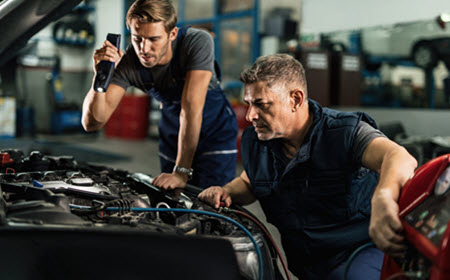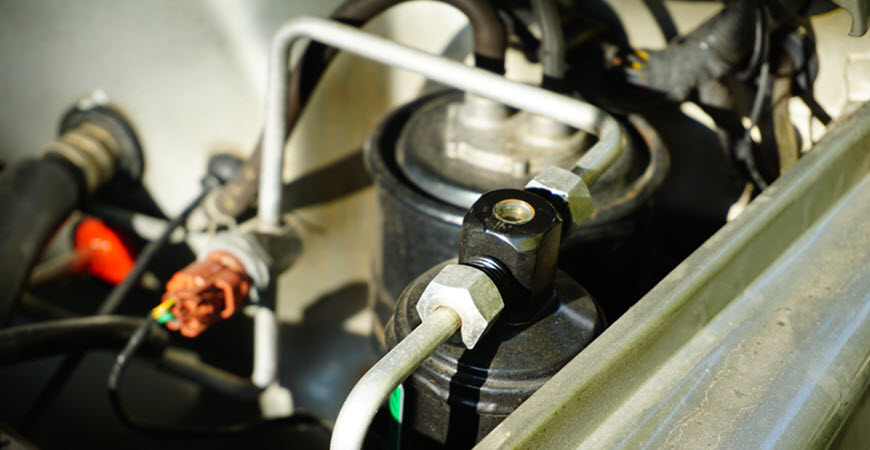Porsche is synonymous with performance, endurance, luxury, and power. However, when parts start to fail, any one of these qualities can slip, meaning drivers lose the incredible driving experience and handling of these renowned vehicles. Porsche isn’t without its imperfections. The brand is known for a few types of part failure. One such part failure that is commonly experienced is the failure of the pressure accumulator.
While no driver is expected to know the mechanical detail of every part and system of their car, when it comes to looking out for the signs and symptoms of failures common to your model of vehicle, you should always be aware. In this article, we’ll be taking a closer look at your Porsche’s pressure accumulator and find out what it does and why it can fail.
What does the pressure accumulator do?
The pressure accumulator is a part which appears several times throughout your vehicle and is a hydraulic component in charge of helping your Porsche’s fluids perform properly. Some of the systems which use a pressure accumulator to control fluid pressure levels are the A/C, brakes, fuel system, clutch assembly, transmission, and suspension. The accumulator is able to store and release pressure when needed to allow these systems to work. It collects energy from other systems which don’t need it, such as when your vehicle decelerates or coasts or is idle and provides with it needs it like when it brakes or accelerates.
The pressure accumulator has multiple parts, such as the chambers, pistons, pumps, valves, hydraulic lines and so on. The failure of any of these parts can cause a noticeable problem and display a variety of symptoms which will need fixing.
Signs and Symptoms of Pressure Accumulator Failure
Your Porsche uses a hydraulic pressure accumulator for many of its systems. Failure can greatly impact your vehicle’s overall performance or certain systems won’t work at all. Depending on what system the failed accumulator supports, symptoms can vary greatly. Therefore, we’ve listed below some of the most common experienced by Porsche drivers.
1. Poorly Functioning Brake or Clutch
Pressurized brake and transmission fluid is essential for the safe operation of your vehicle. Therefore, if the clutch seems slow to respond, or worse, your brakes seem reduced in function, it is likely you have a pressure accumulator issue that needs investigating immediately.
2. Poor Cold Air Production of A/C
Your A/C uses hydraulic pressure to produce cold air. Without the correct pressure, the air flow will be weak and definitely won’t circulate the entire vehicle.
3. Suspension Problems
Your Porsche’s suspension uses hydraulic pressure to absorb impacts and shock from the roads. Therefore, if the accumulator has failed in this area, you’re going to notice far more of the bumps and lumps of the road.
4. Warning Lights
Accumulator failure can cause both the check engine light and the brake light to illuminate as well as other less common warning lights. It is important never to ignore these lights as they are designed to keep you and your car safe as well as prevent further problems. These lights will emit codes which can be read by the diagnostic equipment of a qualified mechanic, which means getting to the route of the problem will be quick and straightforward.
Why Accumulator Failure Occurs
There is one main reason as to why accumulator failure happens: pressure loss. This pressure loss can occur in many areas throughout the system and includes seals, valves, and hydraulic lines. Leaks can reduce the amount of pressure that can be stored or can cause fluid to leak, resulting in lowered performance or complete part failure.
Escondido German Auto Shop
The expert team of dedicated mechanics at  Escondido German Autoshop are perfectly placed to offer top-tier services to those living in and around Escondido, Rancho Bernardo, and Valley Center, CA. They have an overwhelming knowledge base for European vehicles and are specialists in servicing Audi, BMW, Mercedes-Benz, MINI, Porsche, Sprinter, and Volkswagen. So if you notice your Porsche starts displaying the tell-tale signs of pressure accumulator failure, don’t delay in calling our team at Escondido today.
Escondido German Autoshop are perfectly placed to offer top-tier services to those living in and around Escondido, Rancho Bernardo, and Valley Center, CA. They have an overwhelming knowledge base for European vehicles and are specialists in servicing Audi, BMW, Mercedes-Benz, MINI, Porsche, Sprinter, and Volkswagen. So if you notice your Porsche starts displaying the tell-tale signs of pressure accumulator failure, don’t delay in calling our team at Escondido today.

